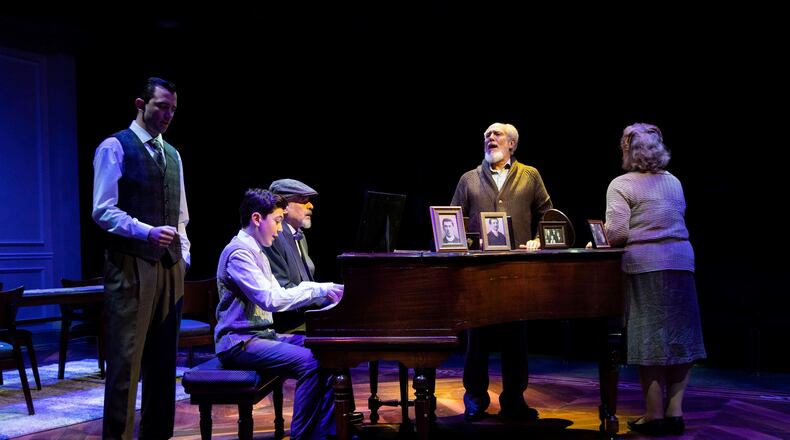While I have been an admirer of Joshua Harmon’s work for several years, his newest play “Prayer for the French Republic,” which boldly explores life across the Jewish diaspora, may be his most poignant and affecting piece yet. It is currently being performed through May 14 at Actor’s Express in a production that will move, terrify, and invite you to think about what it means to be Jewish in today’s world.
Set in the fall of 2016, the play opens with Marcelle Benhamou (Carolyn Cook) welcoming distant cousin Molly (Aliya Rose Kraar) to her spacious Paris apartment (designed with a modern flair by Isabel and Moriah Curley-Clay). The two trace their common ancestors, riffing on the confusing terminology of third cousin vs. fourth cousin (they’re third cousins once removed, by the way), before we are introduced to the rest of Marcelle’s family: her husband Charles (Jared Simon), daughter Elodie (Faina Khibkin), and son Daniel (Adir Lev Mann).
Credit: Casey Gardner Ford
Credit: Casey Gardner Ford
Daniel, a devout Orthodox Jew, has just been beaten on the street for wearing a yarmulke in public, but ignores his mother’s pleas that he not broadcast his religion so publicly. However, as antisemitism in Europe continues to rise, Charles begins to ponder whether it is safer to stay in France or relocate to Israel.
Meanwhile, in 1945, Marcelle’s great-grandparents Irma and Adolphe Salomon (Susan Shalhoub Larkin and Barry Stoltze) anxiously await word from their children, who have recently been liberated from the concentration camps. Their son, Lucien (Shaun MacLean), is the only one who returns, having lost his wife and daughters during the Holocaust. His son, Pierre (Jacob Sherman, later played in the modern day by Clayton Landey), has also survived, and the two of them struggle to readjust to life in Paris.
Written in response to the global rise in antisemitic violence, “Prayer for the French Republic” plumbs the depth of the Jewish soul to uncover how generations of trauma have impacted modern-day Jewish consciousness. Harmon wastes little time with preamble, jumping from Marcelle and Molly’s banal first meeting into Charles hauling a bloodied and bruised Daniel into the apartment. The script also has a sharp wit, though not as consistently funny as some of Harmon’s other plays.
Harmon has also dug deep into Jewish history, drawing parallels between the violence that European Jews face in the 21st century with various other periods throughout history. He references the Algerian expulsion of Jewish citizens in 1963, the People’s Crusades and subsequent Rhineland massacres, and even the enslavement of Jews in Egypt. As Elodie so passionately states: “Every country in history has, at some point, turned its back on its Jews.” Harmon does not rely solely on the Holocaust to carry that message — in fact, though it hangs like a specter throughout, the Holocaust is never directly named.
The production is further elevated by Freddie Ashley’s keen direction and excellent performances from the talented cast. Carolyn Cook is a particular standout, peeling back the layers of Marcelle’s sarcasm to reveal the fear and uncertainty underneath. Susan Shalhoub Larkin is also extremely sympathetic as Irma. When she and Barry Stolze emerge for the final tableau, their awestruck wonder brought tears to my eyes.
Jared Simon and Ross Benjamin give top-notch performances as Charles and Patrick (Marcelle’s less traditional brother and the play’s narrator). Simon’s fear over the threat of antisemitism is palpable and Benjamin brings a flippant energy to the larger family scenes that raises the intensity of those scenes to a fever pitch.
Faina Khibkin, Adir Lev Mann, and Aliya Rose Kraar are also well-balanced as Elodie, Daniel, and Molly, respectively. Khibkin comes to life during Elodie’s impassioned political rants, and Mann and Kraar have a natural chemistry that is very easy to watch. The cast even features an impressive performance from Jacob Sherman as the young Pierre.
The design work is mostly subtle, but works to augment the emotional impact of the story. Jen J. Madison’s costumes are simple and modern, and Joseph P. Monaghan III’s lights bring nuance and richness to the play’s more meta-theatrical scenes. While Isabel and Moriah Curley-Clay’s design for the Benhamou’s apartment, combined with Nick Battaglia’s set decoration, evokes an elegant Parisian atmosphere, they wisely use only a section of the stage to represent Irma and Adolphe’s apartment. Monaghan’s lights work to further isolate the space, creating the feel of a cramped living quarters, highlighting how far Marcelle’s family has come. Yet, despite their financial success, Marcelle finds herself faced with the same choice as her great-grandparents: stay and fight for her home or flee to ensure her family’s safety.
This cyclical nature of history is Harmon’s thesis statement, and the most heartbreaking thing about “Prayer for the French Republic.” No matter how many atrocities the Jewish people survive, the same hatred continues to reappear, generation after generation. And yet, against all odds, they survive. Despite repeated attempts to eradicate them, Jews persist. Celebrating that fact, “Prayer to the French Republic” ends on a note that is both frightening and triumphant, and emphasizes that no matter what, the Jewish people are not going anywhere.
THEATER REVIEW
“Prayer for the French Republic”
Through May 14. $36-$42. Actor’s Express (at King Plow Arts Center), 887 W. Marietta St. NW, Atlanta. 404-607-7469. www.actors-express.com.
About the Author
Keep Reading
The Latest
Featured



